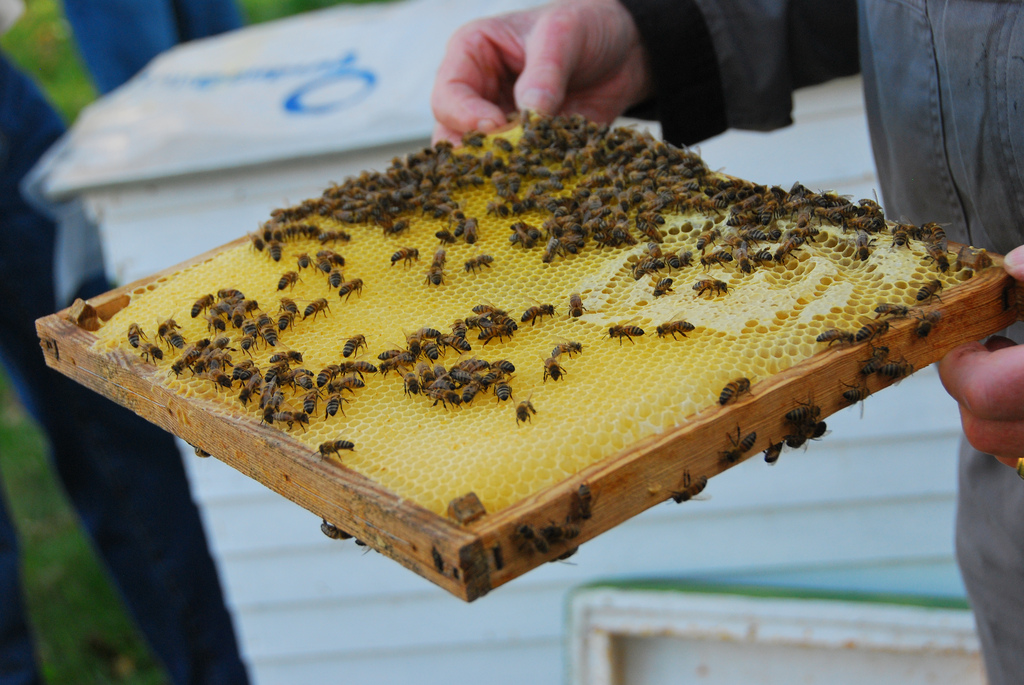 Guest post by Ken Mueller
Guest post by Ken Mueller
A bee in my bonnet
Often when my wife and I are taking our dog, Shadow, for a walk, we go past a house in our neighborhood that has grabbed my attention.
There are two vehicles parked out front bearing license plates that include variations on the word “beeswax.” The front yard of the house is decorated with a variety of ornamental beehives and other bee-themed items.
I”˜ve concluded that the family that lives there is in the beekeeping business, and I swear that one day I will knock on their door and ask them to tell me about it.
You see, while I know nothing about beekeeping, it fascinates me. We are raised to fear bees, and yet here is someone who makes a living off of raising them and harvesting their honey.
It’s outside of my frame of reference, and even my comfort zone, and yet I could see myself trying my hand at it someday.
But I’m a marketing and communications guy. Why would I be interested in bees and honey? Shouldn’t I be focusing on honing my craft instead?
Nope.
In fact, I’ll go as far as to say that I think this is why so many of us struggle with creating content for our blogs or other online social properties. We focus so much on our own business and what it is that we do, that we don’t allow ourselves to breathe. We seek to tell stories, but too often the stories are too me-centric.
I blog every day, and if all I did was focus on marketing and communications and social media, I’d be pretty boring. OK, perhaps some of you already think that, but I love learning about all sorts of things. I want to be a well-rounded person. As I blog, I want to draw in ideas and concepts from other disciplines.
It is for this reason that I’m grateful to Shonali for introducing me to the world of cricket. It takes me out of my own little world and opens me up to new ideas and concepts.
As individuals, and as businesses, we often operate as if we are the center of the universe.
By reaching out and learning about things that are “different,” we understand that everything else doesn’t revolve around us.
I’m grateful to my friends who use Twitter and Facebook to share their love of different types of music, a wide variety of authors, and even strange and exotic foods. I love learning from my friends who live, or have lived, in other countries, or even other parts of the country.
Don’t be defined by what you do. Instead, learn from others. Incorporate outside elements and influences into your work in order to make it more interesting.
Heck, it’ll make you more interesting, and you’ll be surprised how it will help you connect with more people in deeper, more meaningful ways.
In fact, that personal touch of being interested in others, and being able to communicate with them about the things that interest them might actually be the element that wins them over and makes them want to work with you as opposed to your competitor.
So think about the bees, and cricket (are you sensing a theme?) and step outside your comfort zone a bit.
You might actually like it. And chances are it might make you a better business person.
Image: julochka via Flickr, CC 2.0
 Ken Mueller is the owner of Inkling Media, a Social Media and Inbound Marketing sole proprietorship in Lancaster, Pa. In addition to being the hippest cat on the planet, Ken loves working with small businesses and non-profits. He also loves sports (especially cricket!), music, and reading. He can be found working from his front porch with his trusty sidekick, Shadow, a Chocolate Lab.
Ken Mueller is the owner of Inkling Media, a Social Media and Inbound Marketing sole proprietorship in Lancaster, Pa. In addition to being the hippest cat on the planet, Ken loves working with small businesses and non-profits. He also loves sports (especially cricket!), music, and reading. He can be found working from his front porch with his trusty sidekick, Shadow, a Chocolate Lab.
![[EVENT]: PR Hacks for Small Biz (online)](https://shonaliburke.com/wp-content/uploads/2021/06/FB-Ad-1200x800-01-01-01-Copy-500x383.jpeg)








I’m just thrilled that you are so into cricket… and now your other family members are getting into it!
@Shonali it’s running rampant over here!
[…] Additionally, by venturing into unknown territories outside of our comfort zone, we’ll become more well-rounded, more diverse in our interests, and have more information at our disposal as we seek to engage others through relevant and compelling content. I recently blogged about this over at Shonali Burke‘s blog when I discussed my new fascination with beekeeping and how it helps me in my business. […]
Sometimes I feel a little ‘me’ centric when writing; but it seems to be the best way I can relate or tell a story. So far, I have pretty much stayed away from my profession when I write and chose to focus on others as well. Like you, I have a lot to learn and I thoroughly enjoy the opportunities social allows for me to do this.
Good to see you at Shonali’s, thanks for sharing.
@bdorman264 And good to see you here as well, Bill. I think that anytime we tell a story, there will be some sort of “me” factor involved, I mean…they’re our stories. But it’s how we relate those stories that makes the difference. Even if I tell a story about beekeeping, it will be from my personal perspective, as an outsider.
@KenMueller@bdorman264 I was thinking about that recently. Every now and then you’ll see bloggers/pundits saying not to use “me” or to talk about yourself. I understand that people can go overboard doing that, but on the other hand, I find posts where people are describing their own experiences – in the first person – much more interesting.
I think you focus most on what you are doing that’s make you happy and makes you a fortune.
One of my favorite classes in grad school was my form and theory class. You would think that we students would have spent our time reading philosophies and theories about writing (we did), but our professor expanded the scope by bringing in art, film, and music.
One of the things I like most about writing is it ability to include and incorporate different things. I was reading a book that talked about how writers need to refuel the writing fire on a constant basis. The only way to do that is to stop focusing on ourselves and start seeing what is happening outside our little spheres.
@Erin F. Theory was one of my favorite courses during my undergraduate and graduate courses. The widening definition of what constituted a ‘text’ definitely opened up the discussion about how any piece of popular culture could be examined and analyzed with the same intellectual rigor, using the same vocabulary, as those works in the Western literary canon. I’m still heavily influenced by the critical works of Derrida, Barthes and Harold Bloom, among others.
@jasonkonopinski I felt lost the entire time I was in that theory class, but it made a huge impact on my thinking. I return to a lot of the essays now. I’m actually re-reading Fanny Howe’s “Bewilderment” in preparation for a possible video about writing and why being lost is a good place to be.
@Erin F. I like that last part: stop focusing on ourselves and start examining what is going on outside. Even incorporating our other interests that we might not think are relevant.
@KenMueller I think part of the fun is to bring seemingly non-similar things together.
We have many beekeepers in our area, and it’s always fun to watch them out harvesting the combs for honey. I will await with eagerness your post on “what I learned about beekeeping”:)
I have a mantra: learn something/do something different every day. It can be as simple as writing with my non-dominant hand, reading a book on a topic I wouldn’t normally pick, or “tagging on” to ideas and concepts to keep a story line going and growing.
I like Shakirah’s word: eclectic. I’d like to think that I, too, am eclectic in interests and topics, and I have no problem stepping outside my comfort zone. It’s scary fun! Cheers! Kaarina
@KDillabough I’m trying to learn something new from all of my clients and other people I meet. In fact, the comments here are becoming fodder for another blog post over on my blog in the not to distant future.
As I read this, thinking about my own blogging and business shortcomings, I actually turned it around. Maybe it’s not such a bad thing that my own blog is this eclectic mix of language loving, social media rants, and marketing/writing tips.
@ShakirahDawud I think an eclectic mix can be a draw. Most of the blogs I read have a mix, and I find that the blogs that are too narrowly focused get kind of boring, and are often “me-centric”. Though there is always the risk of being a bit too eclectic and random. While I try to mix it up, I still want to have some sort of central theme and focus that comes back to small businesses.
@ShakirahDawud I love your blog. Especially your rants, because the way you do them is quite unique.
As I say when I speak…there is only one person in this entire world who thinks you’re as fascinating as you are. Your mom.
@ginidietrich I love learning from other people, and I believe that we can learn a lot from everyone. All we need to do is shut up and listen and give them a chance. I still need to learn about beekeeping.
@KenMueller@ginidietrich in my area we have people who sell organic chicken eggs, heirloom tomatoes, etc. In addition to the actual farms and orchard growers. And we have a beekeeper too. But I think he lost his bees. He used to sell his honey from an honor stand.
@HowieSPM@KenMueller@ginidietrich Apiaries are alive and well in the area – and if you’re an allergy sufferer, eating local honey is one of the best ways to keep them at bay.
There’s a bigger lesson here: specialization is for ants (and other social insects like honeybees and termites), not human beings. A diverse skill set means you’re always in demand.
@HowieSPM@KenMueller In the big city, the closest I get is my CSA.
@ginidietrich@HowieSPM@KenMueller You might be surprised. Urban farming (including beekeeping) is really taking off. In fact, the Franklin Institute in Philadelphia has maintained a bee colony for probably the past 25 years at least. I don’t think they harvest any of the comb or honey, though.
Gini – give Farm City a read. Author shares her experiences of starting a community garden and raising poultry in an abandoned lot in one of the worst neighborhoods in Oakland. It’s great stuff. When I have both time and resources, I’ll definitely have 3 or so chickens for the fresh eggs alone. :)
@jasonkonopinski@HowieSPM@KenMueller@ginidietrich That’s true, although I’m honing my focus with factotum yet again. I think having those other skill sets will enrich the main one, though.
@Erin F.@jasonkonopinski@HowieSPM@ginidietrich One of the biggest movements here in Lancaster is urban farming and gardening. Roof tops, Square foot gardening. Alley gardening. I work with several businesses and organizations that help promote this, including urban composting, etc. Pretty amazing what can be done in a city.